Positive Leader: Authentic Leadership, PsyCap, and LMX Relationships
VerifiedAdded on 2023/05/29
|11
|2878
|100
Report
AI Summary
This report presents a comprehensive literature review exploring the relationships between authentic leadership, psychological capital (PsyCap), and leader-member exchange (LMX). It begins by defining leadership and its various perspectives, then delves into the concept of authentic leadership, emphasizing its focus on honesty and ethical foundations. The report also examines PsyCap, highlighting its components of hope, self-efficacy, resilience, and optimism, and its impact on employee effectiveness. Furthermore, it explores LMX theory, focusing on the quality of leader-follower relationships and their influence on employee experiences. The report then analyzes the interconnections between authentic leadership, PsyCap, and LMX, and their combined effect on employee behavior and organizational outcomes. It also considers the PsyCap of different employee types and the role of emotions in employee performance, providing a detailed overview of the relevant literature and research findings to provide a comprehensive understanding of these critical leadership and management concepts.
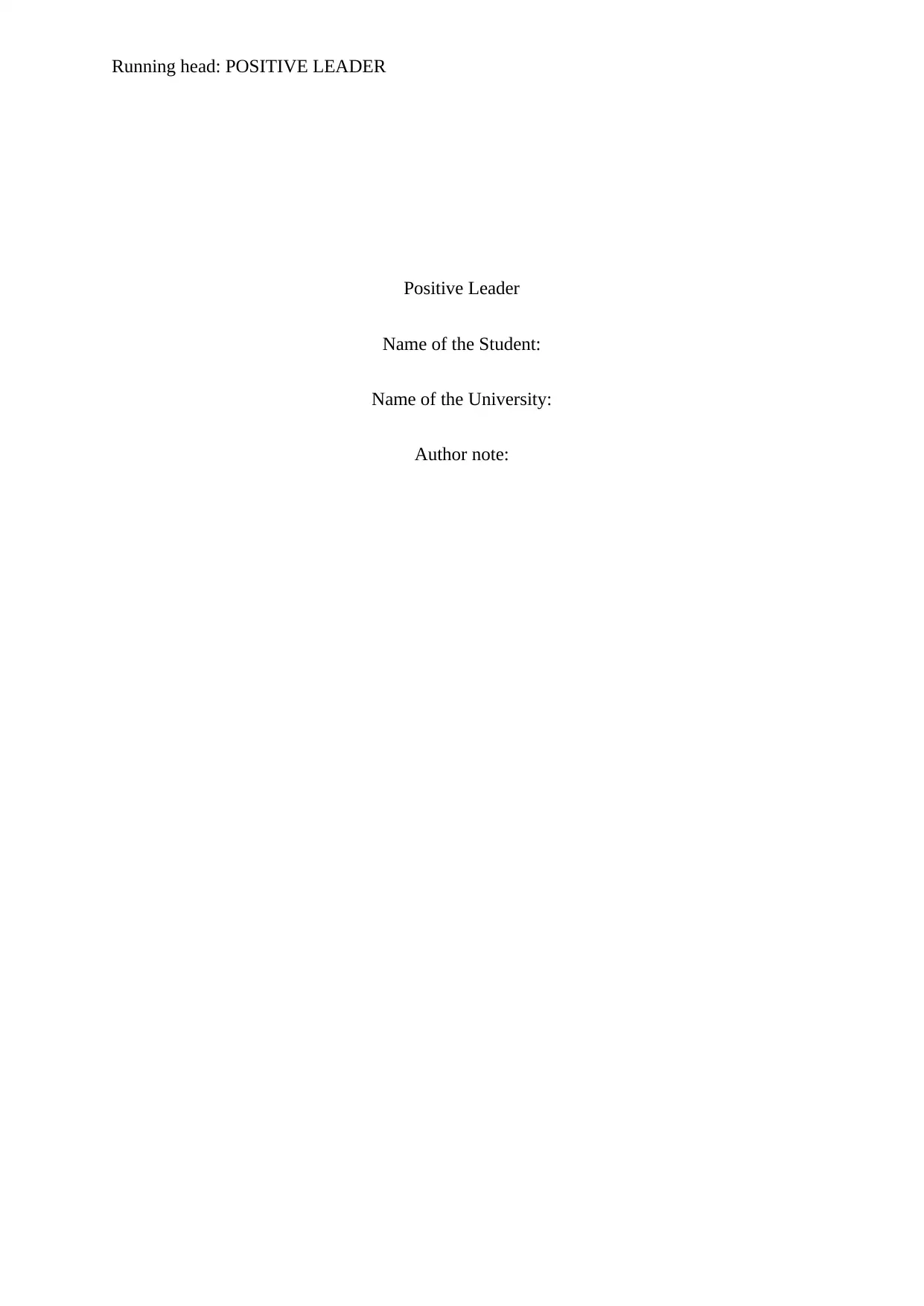
Running head: POSITIVE LEADER
Positive Leader
Name of the Student:
Name of the University:
Author note:
Positive Leader
Name of the Student:
Name of the University:
Author note:
Paraphrase This Document
Need a fresh take? Get an instant paraphrase of this document with our AI Paraphraser
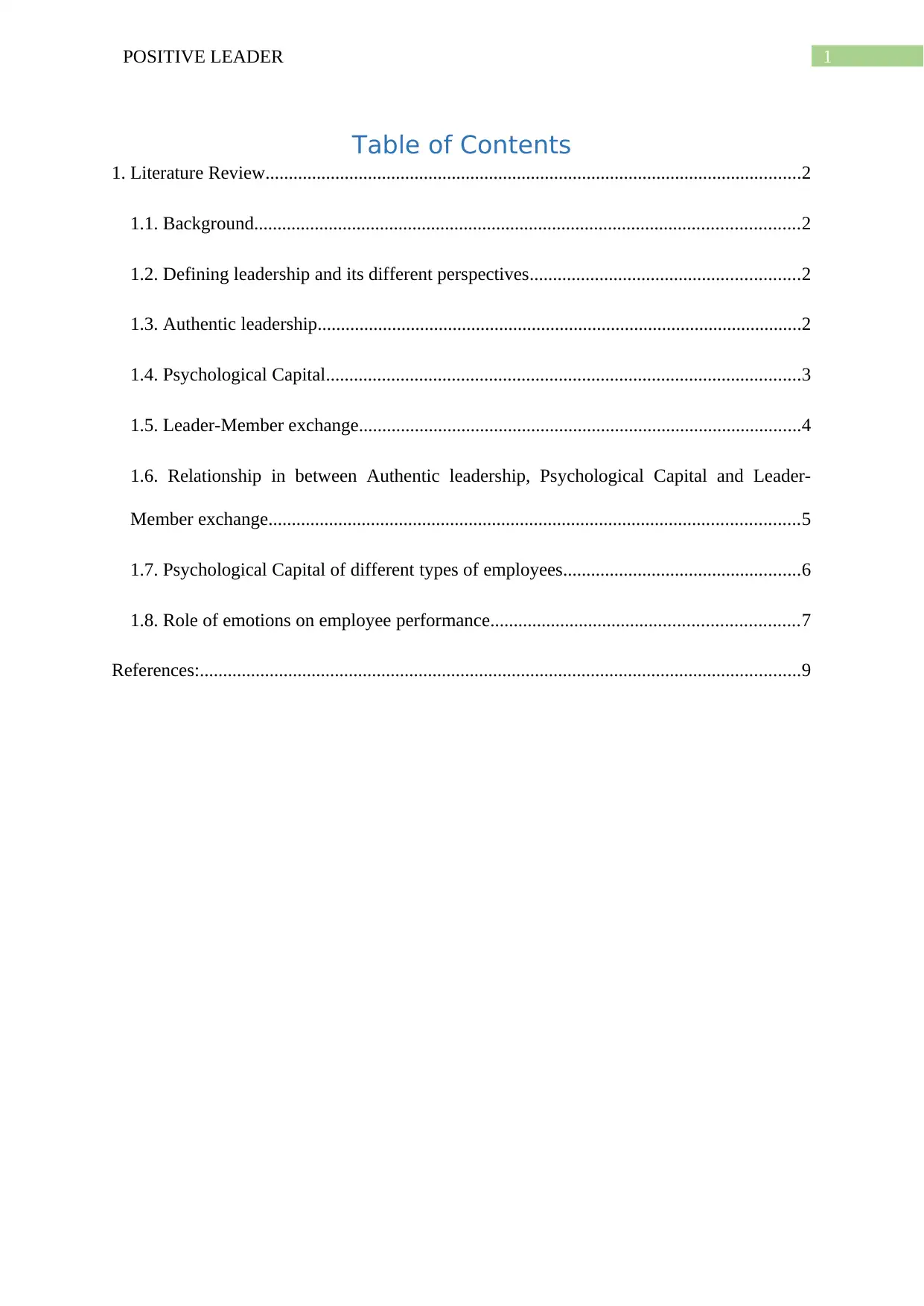
1POSITIVE LEADER
Table of Contents
1. Literature Review...................................................................................................................2
1.1. Background.....................................................................................................................2
1.2. Defining leadership and its different perspectives..........................................................2
1.3. Authentic leadership........................................................................................................2
1.4. Psychological Capital......................................................................................................3
1.5. Leader-Member exchange...............................................................................................4
1.6. Relationship in between Authentic leadership, Psychological Capital and Leader-
Member exchange..................................................................................................................5
1.7. Psychological Capital of different types of employees...................................................6
1.8. Role of emotions on employee performance..................................................................7
References:.................................................................................................................................9
Table of Contents
1. Literature Review...................................................................................................................2
1.1. Background.....................................................................................................................2
1.2. Defining leadership and its different perspectives..........................................................2
1.3. Authentic leadership........................................................................................................2
1.4. Psychological Capital......................................................................................................3
1.5. Leader-Member exchange...............................................................................................4
1.6. Relationship in between Authentic leadership, Psychological Capital and Leader-
Member exchange..................................................................................................................5
1.7. Psychological Capital of different types of employees...................................................6
1.8. Role of emotions on employee performance..................................................................7
References:.................................................................................................................................9
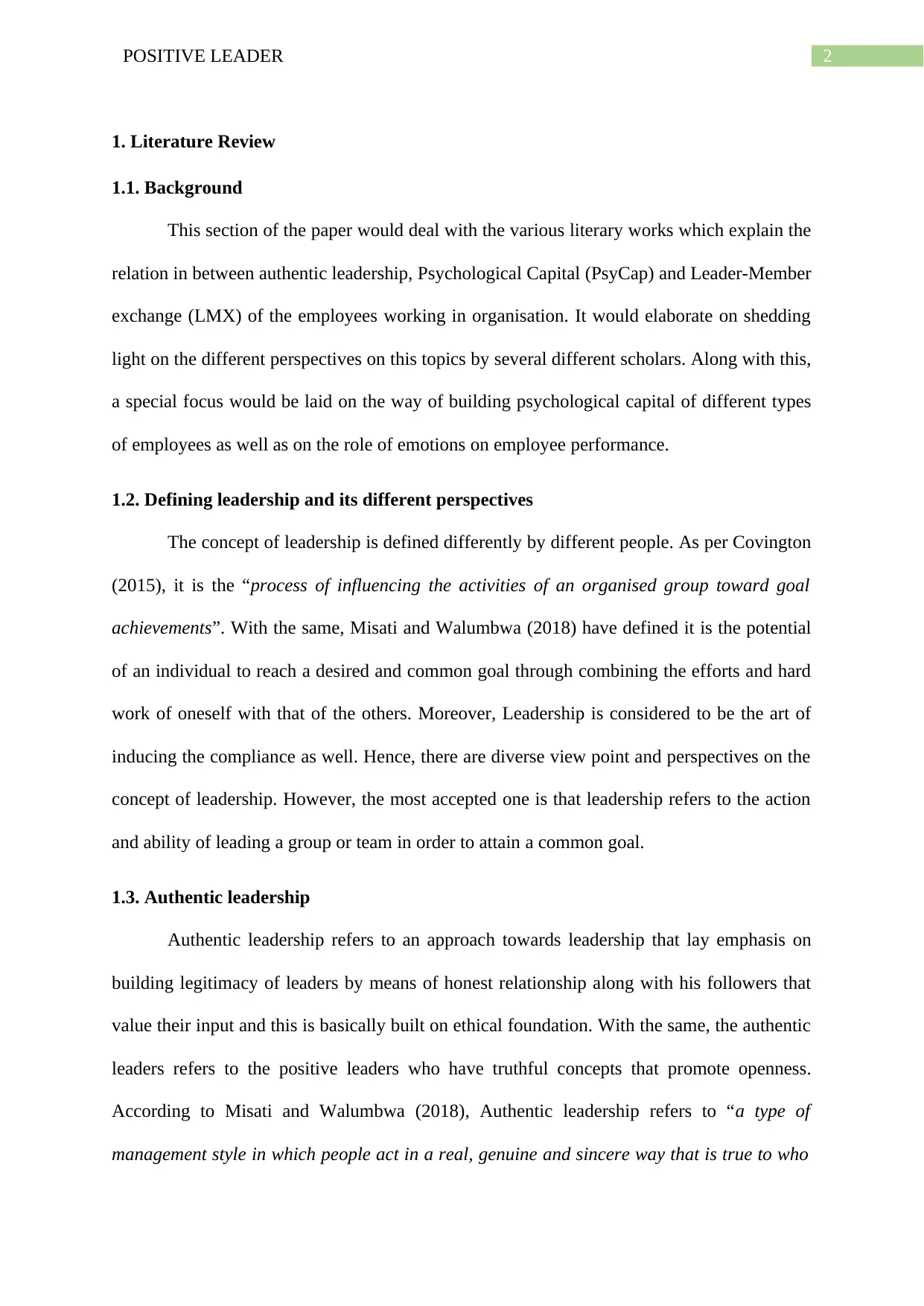
2POSITIVE LEADER
1. Literature Review
1.1. Background
This section of the paper would deal with the various literary works which explain the
relation in between authentic leadership, Psychological Capital (PsyCap) and Leader-Member
exchange (LMX) of the employees working in organisation. It would elaborate on shedding
light on the different perspectives on this topics by several different scholars. Along with this,
a special focus would be laid on the way of building psychological capital of different types
of employees as well as on the role of emotions on employee performance.
1.2. Defining leadership and its different perspectives
The concept of leadership is defined differently by different people. As per Covington
(2015), it is the “process of influencing the activities of an organised group toward goal
achievements”. With the same, Misati and Walumbwa (2018) have defined it is the potential
of an individual to reach a desired and common goal through combining the efforts and hard
work of oneself with that of the others. Moreover, Leadership is considered to be the art of
inducing the compliance as well. Hence, there are diverse view point and perspectives on the
concept of leadership. However, the most accepted one is that leadership refers to the action
and ability of leading a group or team in order to attain a common goal.
1.3. Authentic leadership
Authentic leadership refers to an approach towards leadership that lay emphasis on
building legitimacy of leaders by means of honest relationship along with his followers that
value their input and this is basically built on ethical foundation. With the same, the authentic
leaders refers to the positive leaders who have truthful concepts that promote openness.
According to Misati and Walumbwa (2018), Authentic leadership refers to “a type of
management style in which people act in a real, genuine and sincere way that is true to who
1. Literature Review
1.1. Background
This section of the paper would deal with the various literary works which explain the
relation in between authentic leadership, Psychological Capital (PsyCap) and Leader-Member
exchange (LMX) of the employees working in organisation. It would elaborate on shedding
light on the different perspectives on this topics by several different scholars. Along with this,
a special focus would be laid on the way of building psychological capital of different types
of employees as well as on the role of emotions on employee performance.
1.2. Defining leadership and its different perspectives
The concept of leadership is defined differently by different people. As per Covington
(2015), it is the “process of influencing the activities of an organised group toward goal
achievements”. With the same, Misati and Walumbwa (2018) have defined it is the potential
of an individual to reach a desired and common goal through combining the efforts and hard
work of oneself with that of the others. Moreover, Leadership is considered to be the art of
inducing the compliance as well. Hence, there are diverse view point and perspectives on the
concept of leadership. However, the most accepted one is that leadership refers to the action
and ability of leading a group or team in order to attain a common goal.
1.3. Authentic leadership
Authentic leadership refers to an approach towards leadership that lay emphasis on
building legitimacy of leaders by means of honest relationship along with his followers that
value their input and this is basically built on ethical foundation. With the same, the authentic
leaders refers to the positive leaders who have truthful concepts that promote openness.
According to Misati and Walumbwa (2018), Authentic leadership refers to “a type of
management style in which people act in a real, genuine and sincere way that is true to who
⊘ This is a preview!⊘
Do you want full access?
Subscribe today to unlock all pages.

Trusted by 1+ million students worldwide
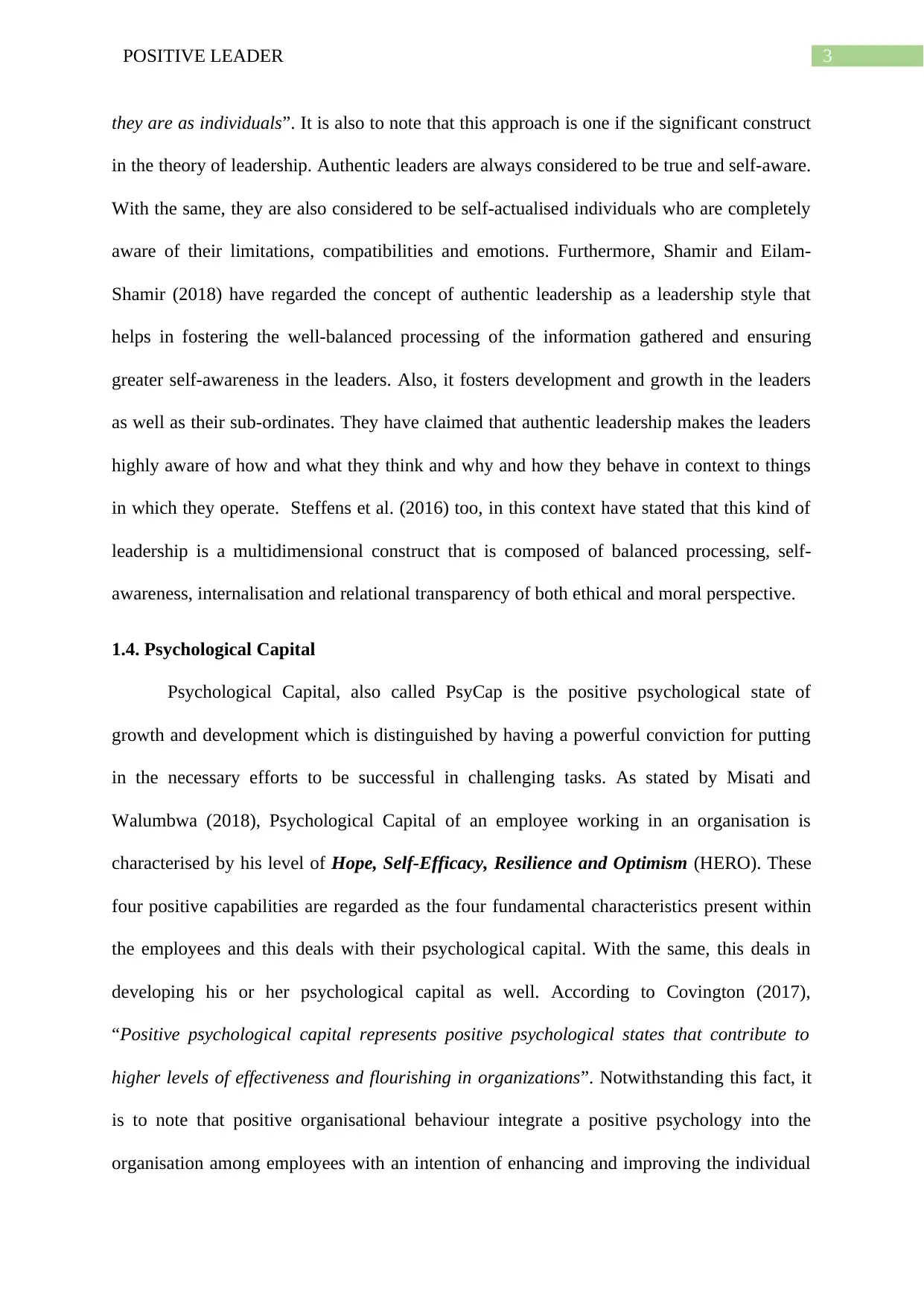
3POSITIVE LEADER
they are as individuals”. It is also to note that this approach is one if the significant construct
in the theory of leadership. Authentic leaders are always considered to be true and self-aware.
With the same, they are also considered to be self-actualised individuals who are completely
aware of their limitations, compatibilities and emotions. Furthermore, Shamir and Eilam-
Shamir (2018) have regarded the concept of authentic leadership as a leadership style that
helps in fostering the well-balanced processing of the information gathered and ensuring
greater self-awareness in the leaders. Also, it fosters development and growth in the leaders
as well as their sub-ordinates. They have claimed that authentic leadership makes the leaders
highly aware of how and what they think and why and how they behave in context to things
in which they operate. Steffens et al. (2016) too, in this context have stated that this kind of
leadership is a multidimensional construct that is composed of balanced processing, self-
awareness, internalisation and relational transparency of both ethical and moral perspective.
1.4. Psychological Capital
Psychological Capital, also called PsyCap is the positive psychological state of
growth and development which is distinguished by having a powerful conviction for putting
in the necessary efforts to be successful in challenging tasks. As stated by Misati and
Walumbwa (2018), Psychological Capital of an employee working in an organisation is
characterised by his level of Hope, Self-Efficacy, Resilience and Optimism (HERO). These
four positive capabilities are regarded as the four fundamental characteristics present within
the employees and this deals with their psychological capital. With the same, this deals in
developing his or her psychological capital as well. According to Covington (2017),
“Positive psychological capital represents positive psychological states that contribute to
higher levels of effectiveness and flourishing in organizations”. Notwithstanding this fact, it
is to note that positive organisational behaviour integrate a positive psychology into the
organisation among employees with an intention of enhancing and improving the individual
they are as individuals”. It is also to note that this approach is one if the significant construct
in the theory of leadership. Authentic leaders are always considered to be true and self-aware.
With the same, they are also considered to be self-actualised individuals who are completely
aware of their limitations, compatibilities and emotions. Furthermore, Shamir and Eilam-
Shamir (2018) have regarded the concept of authentic leadership as a leadership style that
helps in fostering the well-balanced processing of the information gathered and ensuring
greater self-awareness in the leaders. Also, it fosters development and growth in the leaders
as well as their sub-ordinates. They have claimed that authentic leadership makes the leaders
highly aware of how and what they think and why and how they behave in context to things
in which they operate. Steffens et al. (2016) too, in this context have stated that this kind of
leadership is a multidimensional construct that is composed of balanced processing, self-
awareness, internalisation and relational transparency of both ethical and moral perspective.
1.4. Psychological Capital
Psychological Capital, also called PsyCap is the positive psychological state of
growth and development which is distinguished by having a powerful conviction for putting
in the necessary efforts to be successful in challenging tasks. As stated by Misati and
Walumbwa (2018), Psychological Capital of an employee working in an organisation is
characterised by his level of Hope, Self-Efficacy, Resilience and Optimism (HERO). These
four positive capabilities are regarded as the four fundamental characteristics present within
the employees and this deals with their psychological capital. With the same, this deals in
developing his or her psychological capital as well. According to Covington (2017),
“Positive psychological capital represents positive psychological states that contribute to
higher levels of effectiveness and flourishing in organizations”. Notwithstanding this fact, it
is to note that positive organisational behaviour integrate a positive psychology into the
organisation among employees with an intention of enhancing and improving the individual
Paraphrase This Document
Need a fresh take? Get an instant paraphrase of this document with our AI Paraphraser
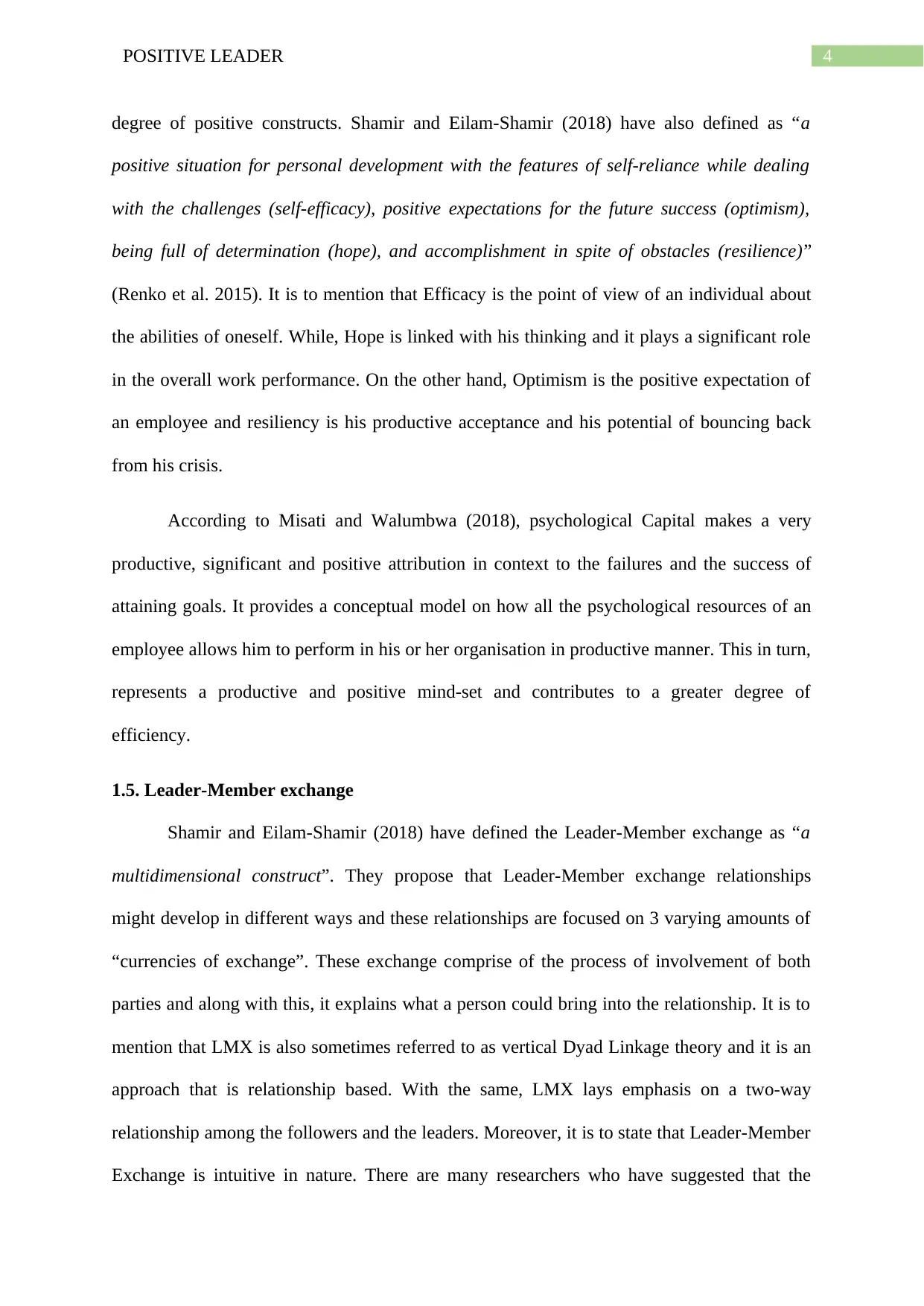
4POSITIVE LEADER
degree of positive constructs. Shamir and Eilam-Shamir (2018) have also defined as “a
positive situation for personal development with the features of self-reliance while dealing
with the challenges (self-efficacy), positive expectations for the future success (optimism),
being full of determination (hope), and accomplishment in spite of obstacles (resilience)”
(Renko et al. 2015). It is to mention that Efficacy is the point of view of an individual about
the abilities of oneself. While, Hope is linked with his thinking and it plays a significant role
in the overall work performance. On the other hand, Optimism is the positive expectation of
an employee and resiliency is his productive acceptance and his potential of bouncing back
from his crisis.
According to Misati and Walumbwa (2018), psychological Capital makes a very
productive, significant and positive attribution in context to the failures and the success of
attaining goals. It provides a conceptual model on how all the psychological resources of an
employee allows him to perform in his or her organisation in productive manner. This in turn,
represents a productive and positive mind-set and contributes to a greater degree of
efficiency.
1.5. Leader-Member exchange
Shamir and Eilam-Shamir (2018) have defined the Leader-Member exchange as “a
multidimensional construct”. They propose that Leader-Member exchange relationships
might develop in different ways and these relationships are focused on 3 varying amounts of
“currencies of exchange”. These exchange comprise of the process of involvement of both
parties and along with this, it explains what a person could bring into the relationship. It is to
mention that LMX is also sometimes referred to as vertical Dyad Linkage theory and it is an
approach that is relationship based. With the same, LMX lays emphasis on a two-way
relationship among the followers and the leaders. Moreover, it is to state that Leader-Member
Exchange is intuitive in nature. There are many researchers who have suggested that the
degree of positive constructs. Shamir and Eilam-Shamir (2018) have also defined as “a
positive situation for personal development with the features of self-reliance while dealing
with the challenges (self-efficacy), positive expectations for the future success (optimism),
being full of determination (hope), and accomplishment in spite of obstacles (resilience)”
(Renko et al. 2015). It is to mention that Efficacy is the point of view of an individual about
the abilities of oneself. While, Hope is linked with his thinking and it plays a significant role
in the overall work performance. On the other hand, Optimism is the positive expectation of
an employee and resiliency is his productive acceptance and his potential of bouncing back
from his crisis.
According to Misati and Walumbwa (2018), psychological Capital makes a very
productive, significant and positive attribution in context to the failures and the success of
attaining goals. It provides a conceptual model on how all the psychological resources of an
employee allows him to perform in his or her organisation in productive manner. This in turn,
represents a productive and positive mind-set and contributes to a greater degree of
efficiency.
1.5. Leader-Member exchange
Shamir and Eilam-Shamir (2018) have defined the Leader-Member exchange as “a
multidimensional construct”. They propose that Leader-Member exchange relationships
might develop in different ways and these relationships are focused on 3 varying amounts of
“currencies of exchange”. These exchange comprise of the process of involvement of both
parties and along with this, it explains what a person could bring into the relationship. It is to
mention that LMX is also sometimes referred to as vertical Dyad Linkage theory and it is an
approach that is relationship based. With the same, LMX lays emphasis on a two-way
relationship among the followers and the leaders. Moreover, it is to state that Leader-Member
Exchange is intuitive in nature. There are many researchers who have suggested that the
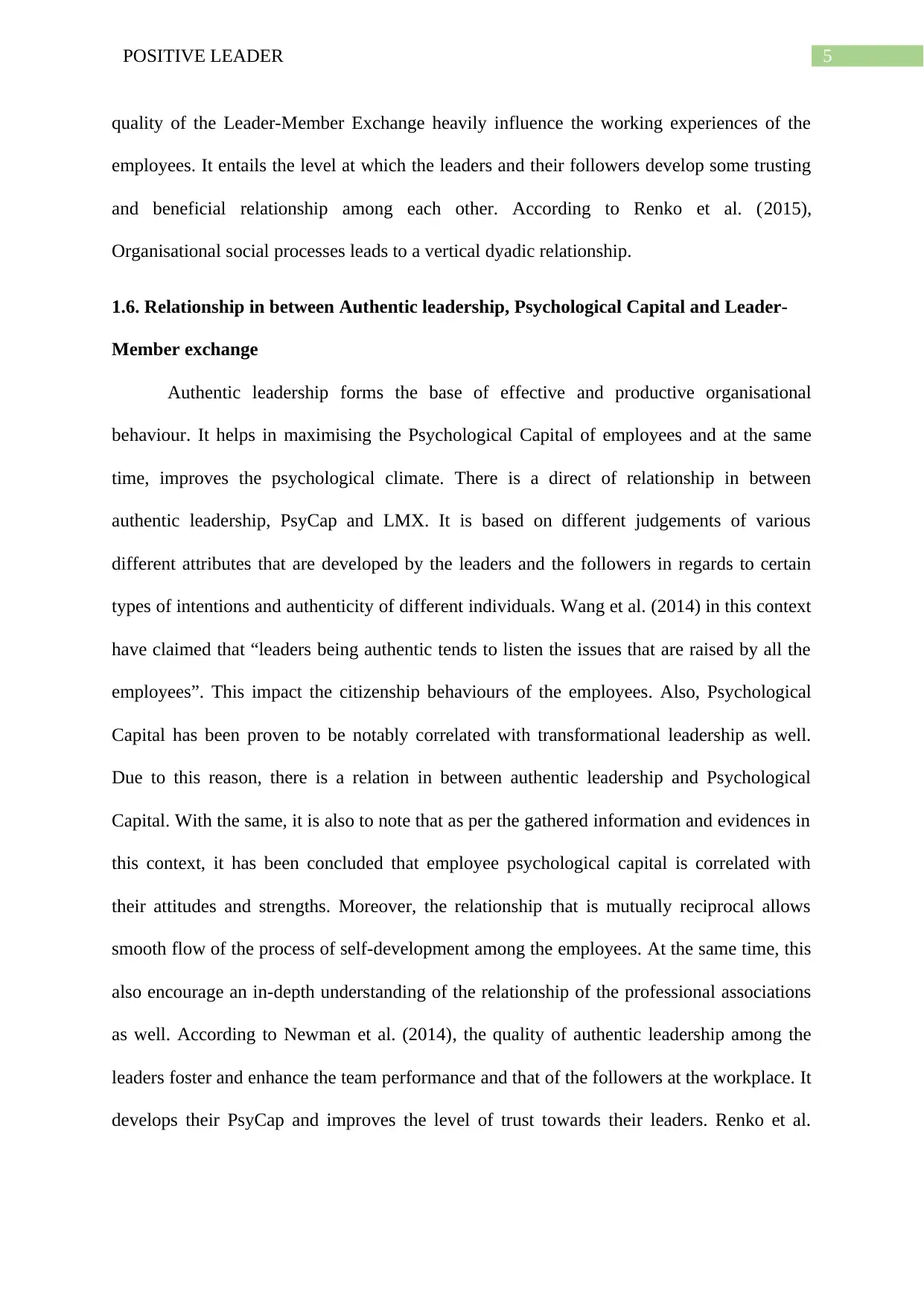
5POSITIVE LEADER
quality of the Leader-Member Exchange heavily influence the working experiences of the
employees. It entails the level at which the leaders and their followers develop some trusting
and beneficial relationship among each other. According to Renko et al. (2015),
Organisational social processes leads to a vertical dyadic relationship.
1.6. Relationship in between Authentic leadership, Psychological Capital and Leader-
Member exchange
Authentic leadership forms the base of effective and productive organisational
behaviour. It helps in maximising the Psychological Capital of employees and at the same
time, improves the psychological climate. There is a direct of relationship in between
authentic leadership, PsyCap and LMX. It is based on different judgements of various
different attributes that are developed by the leaders and the followers in regards to certain
types of intentions and authenticity of different individuals. Wang et al. (2014) in this context
have claimed that “leaders being authentic tends to listen the issues that are raised by all the
employees”. This impact the citizenship behaviours of the employees. Also, Psychological
Capital has been proven to be notably correlated with transformational leadership as well.
Due to this reason, there is a relation in between authentic leadership and Psychological
Capital. With the same, it is also to note that as per the gathered information and evidences in
this context, it has been concluded that employee psychological capital is correlated with
their attitudes and strengths. Moreover, the relationship that is mutually reciprocal allows
smooth flow of the process of self-development among the employees. At the same time, this
also encourage an in-depth understanding of the relationship of the professional associations
as well. According to Newman et al. (2014), the quality of authentic leadership among the
leaders foster and enhance the team performance and that of the followers at the workplace. It
develops their PsyCap and improves the level of trust towards their leaders. Renko et al.
quality of the Leader-Member Exchange heavily influence the working experiences of the
employees. It entails the level at which the leaders and their followers develop some trusting
and beneficial relationship among each other. According to Renko et al. (2015),
Organisational social processes leads to a vertical dyadic relationship.
1.6. Relationship in between Authentic leadership, Psychological Capital and Leader-
Member exchange
Authentic leadership forms the base of effective and productive organisational
behaviour. It helps in maximising the Psychological Capital of employees and at the same
time, improves the psychological climate. There is a direct of relationship in between
authentic leadership, PsyCap and LMX. It is based on different judgements of various
different attributes that are developed by the leaders and the followers in regards to certain
types of intentions and authenticity of different individuals. Wang et al. (2014) in this context
have claimed that “leaders being authentic tends to listen the issues that are raised by all the
employees”. This impact the citizenship behaviours of the employees. Also, Psychological
Capital has been proven to be notably correlated with transformational leadership as well.
Due to this reason, there is a relation in between authentic leadership and Psychological
Capital. With the same, it is also to note that as per the gathered information and evidences in
this context, it has been concluded that employee psychological capital is correlated with
their attitudes and strengths. Moreover, the relationship that is mutually reciprocal allows
smooth flow of the process of self-development among the employees. At the same time, this
also encourage an in-depth understanding of the relationship of the professional associations
as well. According to Newman et al. (2014), the quality of authentic leadership among the
leaders foster and enhance the team performance and that of the followers at the workplace. It
develops their PsyCap and improves the level of trust towards their leaders. Renko et al.
⊘ This is a preview!⊘
Do you want full access?
Subscribe today to unlock all pages.

Trusted by 1+ million students worldwide
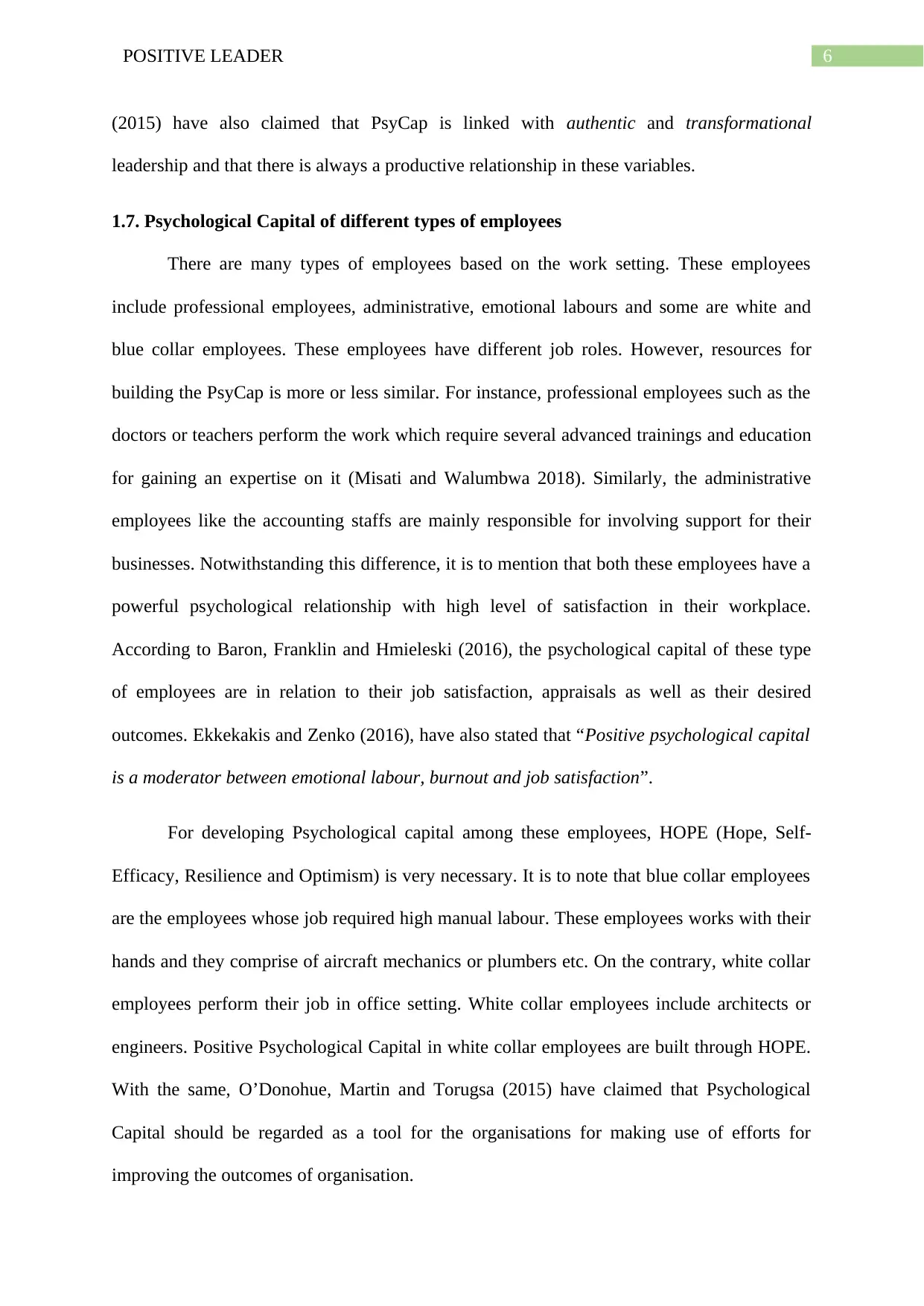
6POSITIVE LEADER
(2015) have also claimed that PsyCap is linked with authentic and transformational
leadership and that there is always a productive relationship in these variables.
1.7. Psychological Capital of different types of employees
There are many types of employees based on the work setting. These employees
include professional employees, administrative, emotional labours and some are white and
blue collar employees. These employees have different job roles. However, resources for
building the PsyCap is more or less similar. For instance, professional employees such as the
doctors or teachers perform the work which require several advanced trainings and education
for gaining an expertise on it (Misati and Walumbwa 2018). Similarly, the administrative
employees like the accounting staffs are mainly responsible for involving support for their
businesses. Notwithstanding this difference, it is to mention that both these employees have a
powerful psychological relationship with high level of satisfaction in their workplace.
According to Baron, Franklin and Hmieleski (2016), the psychological capital of these type
of employees are in relation to their job satisfaction, appraisals as well as their desired
outcomes. Ekkekakis and Zenko (2016), have also stated that “Positive psychological capital
is a moderator between emotional labour, burnout and job satisfaction”.
For developing Psychological capital among these employees, HOPE (Hope, Self-
Efficacy, Resilience and Optimism) is very necessary. It is to note that blue collar employees
are the employees whose job required high manual labour. These employees works with their
hands and they comprise of aircraft mechanics or plumbers etc. On the contrary, white collar
employees perform their job in office setting. White collar employees include architects or
engineers. Positive Psychological Capital in white collar employees are built through HOPE.
With the same, O’Donohue, Martin and Torugsa (2015) have claimed that Psychological
Capital should be regarded as a tool for the organisations for making use of efforts for
improving the outcomes of organisation.
(2015) have also claimed that PsyCap is linked with authentic and transformational
leadership and that there is always a productive relationship in these variables.
1.7. Psychological Capital of different types of employees
There are many types of employees based on the work setting. These employees
include professional employees, administrative, emotional labours and some are white and
blue collar employees. These employees have different job roles. However, resources for
building the PsyCap is more or less similar. For instance, professional employees such as the
doctors or teachers perform the work which require several advanced trainings and education
for gaining an expertise on it (Misati and Walumbwa 2018). Similarly, the administrative
employees like the accounting staffs are mainly responsible for involving support for their
businesses. Notwithstanding this difference, it is to mention that both these employees have a
powerful psychological relationship with high level of satisfaction in their workplace.
According to Baron, Franklin and Hmieleski (2016), the psychological capital of these type
of employees are in relation to their job satisfaction, appraisals as well as their desired
outcomes. Ekkekakis and Zenko (2016), have also stated that “Positive psychological capital
is a moderator between emotional labour, burnout and job satisfaction”.
For developing Psychological capital among these employees, HOPE (Hope, Self-
Efficacy, Resilience and Optimism) is very necessary. It is to note that blue collar employees
are the employees whose job required high manual labour. These employees works with their
hands and they comprise of aircraft mechanics or plumbers etc. On the contrary, white collar
employees perform their job in office setting. White collar employees include architects or
engineers. Positive Psychological Capital in white collar employees are built through HOPE.
With the same, O’Donohue, Martin and Torugsa (2015) have claimed that Psychological
Capital should be regarded as a tool for the organisations for making use of efforts for
improving the outcomes of organisation.
Paraphrase This Document
Need a fresh take? Get an instant paraphrase of this document with our AI Paraphraser
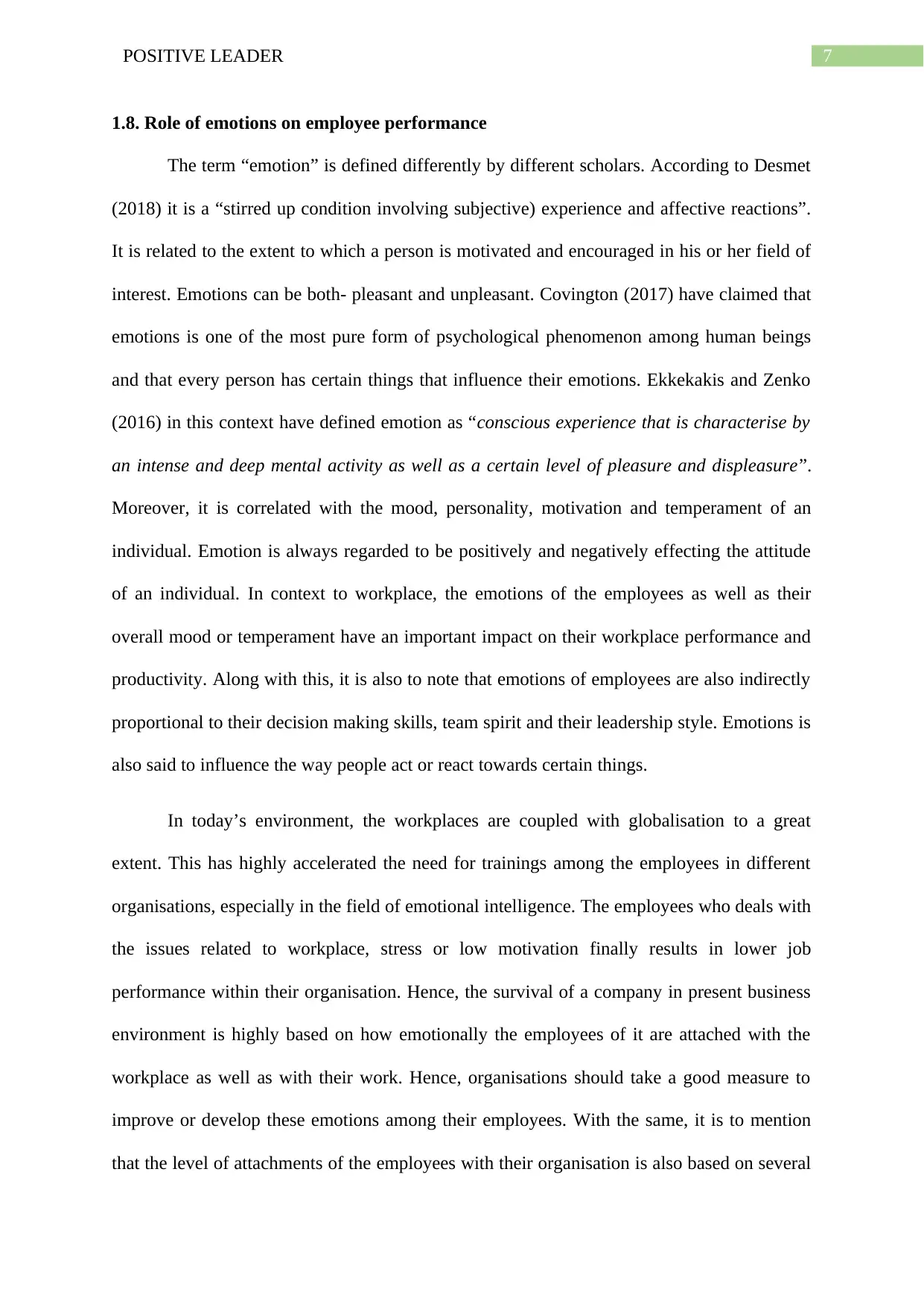
7POSITIVE LEADER
1.8. Role of emotions on employee performance
The term “emotion” is defined differently by different scholars. According to Desmet
(2018) it is a “stirred up condition involving subjective) experience and affective reactions”.
It is related to the extent to which a person is motivated and encouraged in his or her field of
interest. Emotions can be both- pleasant and unpleasant. Covington (2017) have claimed that
emotions is one of the most pure form of psychological phenomenon among human beings
and that every person has certain things that influence their emotions. Ekkekakis and Zenko
(2016) in this context have defined emotion as “conscious experience that is characterise by
an intense and deep mental activity as well as a certain level of pleasure and displeasure”.
Moreover, it is correlated with the mood, personality, motivation and temperament of an
individual. Emotion is always regarded to be positively and negatively effecting the attitude
of an individual. In context to workplace, the emotions of the employees as well as their
overall mood or temperament have an important impact on their workplace performance and
productivity. Along with this, it is also to note that emotions of employees are also indirectly
proportional to their decision making skills, team spirit and their leadership style. Emotions is
also said to influence the way people act or react towards certain things.
In today’s environment, the workplaces are coupled with globalisation to a great
extent. This has highly accelerated the need for trainings among the employees in different
organisations, especially in the field of emotional intelligence. The employees who deals with
the issues related to workplace, stress or low motivation finally results in lower job
performance within their organisation. Hence, the survival of a company in present business
environment is highly based on how emotionally the employees of it are attached with the
workplace as well as with their work. Hence, organisations should take a good measure to
improve or develop these emotions among their employees. With the same, it is to mention
that the level of attachments of the employees with their organisation is also based on several
1.8. Role of emotions on employee performance
The term “emotion” is defined differently by different scholars. According to Desmet
(2018) it is a “stirred up condition involving subjective) experience and affective reactions”.
It is related to the extent to which a person is motivated and encouraged in his or her field of
interest. Emotions can be both- pleasant and unpleasant. Covington (2017) have claimed that
emotions is one of the most pure form of psychological phenomenon among human beings
and that every person has certain things that influence their emotions. Ekkekakis and Zenko
(2016) in this context have defined emotion as “conscious experience that is characterise by
an intense and deep mental activity as well as a certain level of pleasure and displeasure”.
Moreover, it is correlated with the mood, personality, motivation and temperament of an
individual. Emotion is always regarded to be positively and negatively effecting the attitude
of an individual. In context to workplace, the emotions of the employees as well as their
overall mood or temperament have an important impact on their workplace performance and
productivity. Along with this, it is also to note that emotions of employees are also indirectly
proportional to their decision making skills, team spirit and their leadership style. Emotions is
also said to influence the way people act or react towards certain things.
In today’s environment, the workplaces are coupled with globalisation to a great
extent. This has highly accelerated the need for trainings among the employees in different
organisations, especially in the field of emotional intelligence. The employees who deals with
the issues related to workplace, stress or low motivation finally results in lower job
performance within their organisation. Hence, the survival of a company in present business
environment is highly based on how emotionally the employees of it are attached with the
workplace as well as with their work. Hence, organisations should take a good measure to
improve or develop these emotions among their employees. With the same, it is to mention
that the level of attachments of the employees with their organisation is also based on several
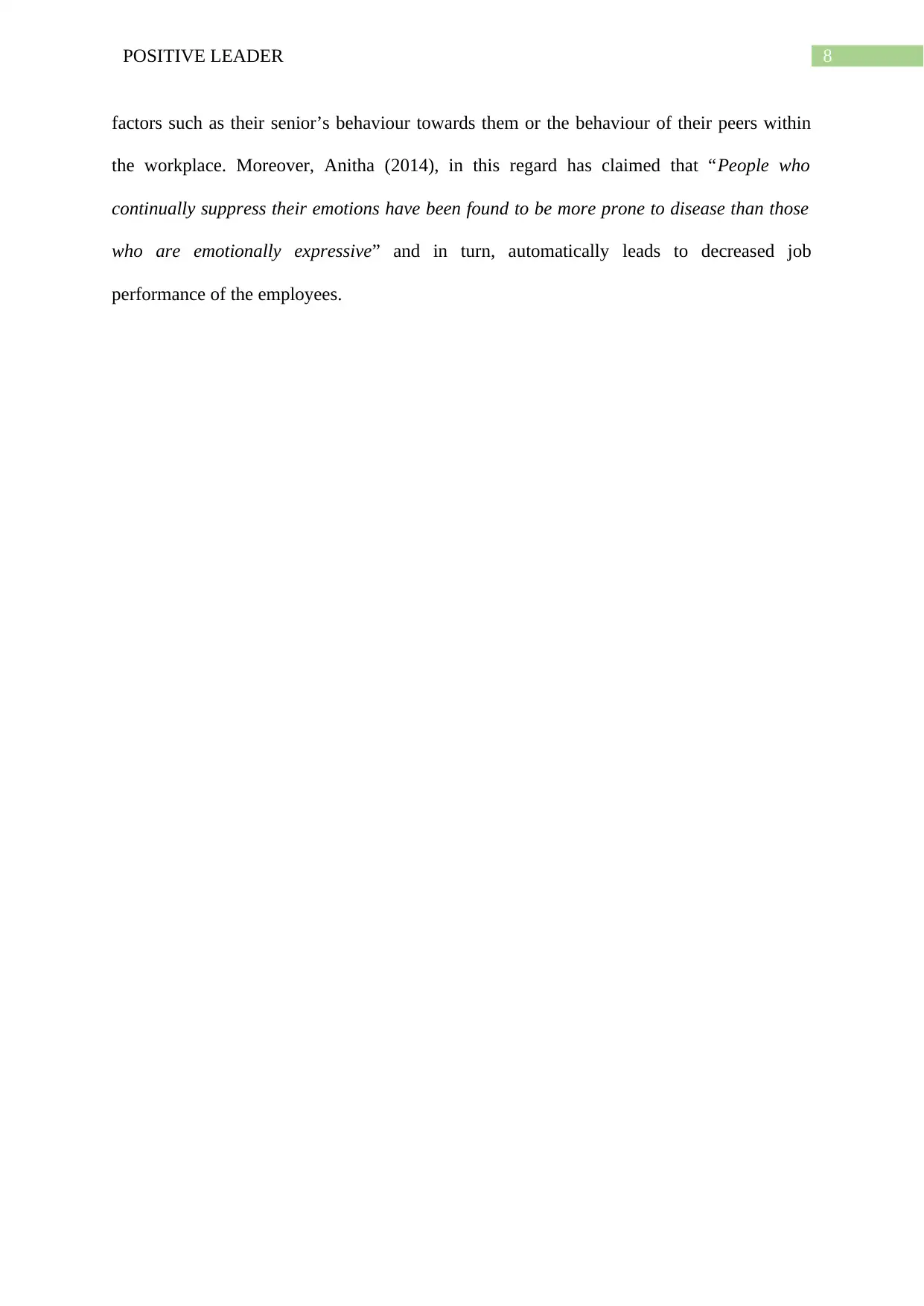
8POSITIVE LEADER
factors such as their senior’s behaviour towards them or the behaviour of their peers within
the workplace. Moreover, Anitha (2014), in this regard has claimed that “People who
continually suppress their emotions have been found to be more prone to disease than those
who are emotionally expressive” and in turn, automatically leads to decreased job
performance of the employees.
factors such as their senior’s behaviour towards them or the behaviour of their peers within
the workplace. Moreover, Anitha (2014), in this regard has claimed that “People who
continually suppress their emotions have been found to be more prone to disease than those
who are emotionally expressive” and in turn, automatically leads to decreased job
performance of the employees.
⊘ This is a preview!⊘
Do you want full access?
Subscribe today to unlock all pages.

Trusted by 1+ million students worldwide
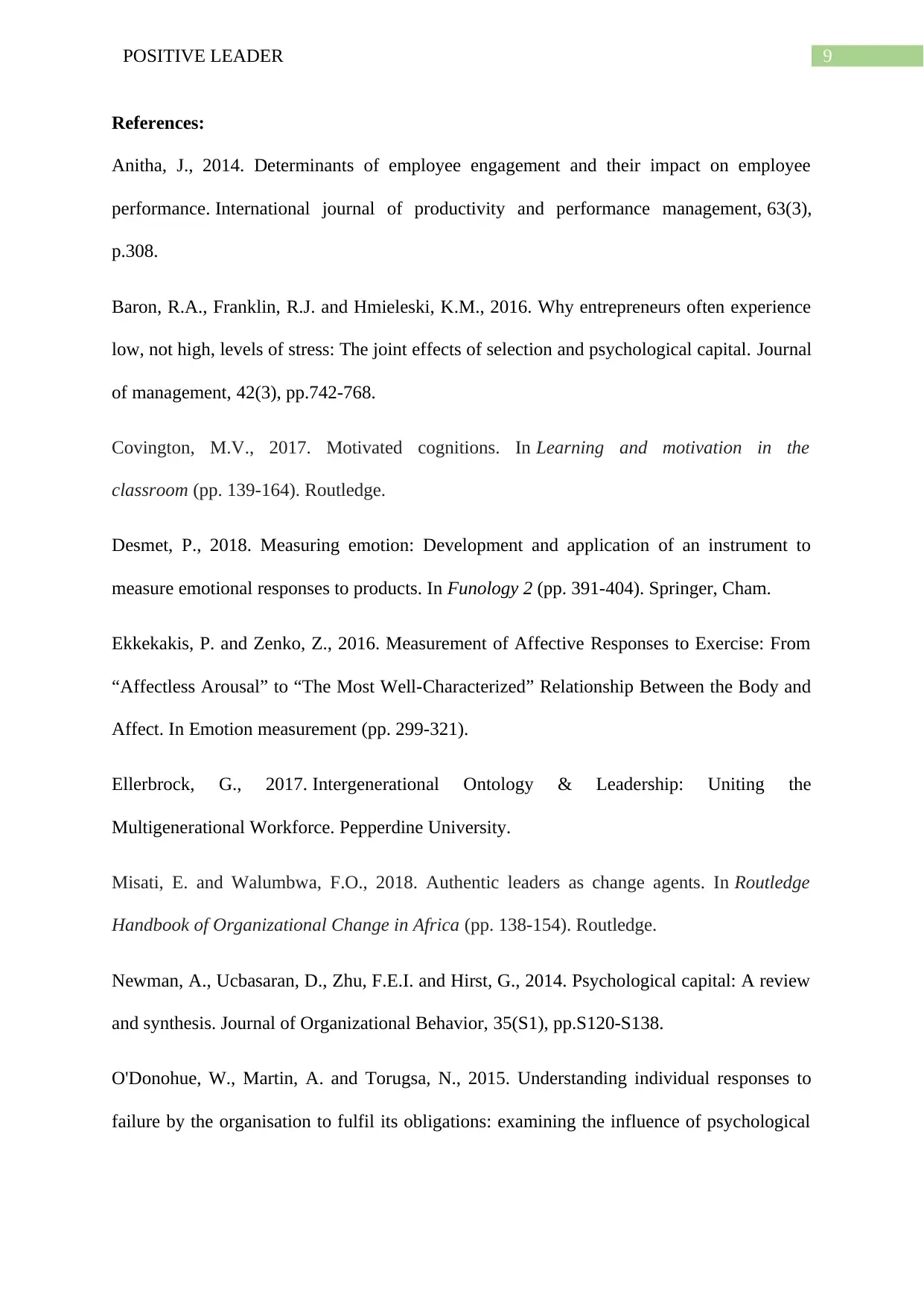
9POSITIVE LEADER
References:
Anitha, J., 2014. Determinants of employee engagement and their impact on employee
performance. International journal of productivity and performance management, 63(3),
p.308.
Baron, R.A., Franklin, R.J. and Hmieleski, K.M., 2016. Why entrepreneurs often experience
low, not high, levels of stress: The joint effects of selection and psychological capital. Journal
of management, 42(3), pp.742-768.
Covington, M.V., 2017. Motivated cognitions. In Learning and motivation in the
classroom (pp. 139-164). Routledge.
Desmet, P., 2018. Measuring emotion: Development and application of an instrument to
measure emotional responses to products. In Funology 2 (pp. 391-404). Springer, Cham.
Ekkekakis, P. and Zenko, Z., 2016. Measurement of Affective Responses to Exercise: From
“Affectless Arousal” to “The Most Well-Characterized” Relationship Between the Body and
Affect. In Emotion measurement (pp. 299-321).
Ellerbrock, G., 2017. Intergenerational Ontology & Leadership: Uniting the
Multigenerational Workforce. Pepperdine University.
Misati, E. and Walumbwa, F.O., 2018. Authentic leaders as change agents. In Routledge
Handbook of Organizational Change in Africa (pp. 138-154). Routledge.
Newman, A., Ucbasaran, D., Zhu, F.E.I. and Hirst, G., 2014. Psychological capital: A review
and synthesis. Journal of Organizational Behavior, 35(S1), pp.S120-S138.
O'Donohue, W., Martin, A. and Torugsa, N., 2015. Understanding individual responses to
failure by the organisation to fulfil its obligations: examining the influence of psychological
References:
Anitha, J., 2014. Determinants of employee engagement and their impact on employee
performance. International journal of productivity and performance management, 63(3),
p.308.
Baron, R.A., Franklin, R.J. and Hmieleski, K.M., 2016. Why entrepreneurs often experience
low, not high, levels of stress: The joint effects of selection and psychological capital. Journal
of management, 42(3), pp.742-768.
Covington, M.V., 2017. Motivated cognitions. In Learning and motivation in the
classroom (pp. 139-164). Routledge.
Desmet, P., 2018. Measuring emotion: Development and application of an instrument to
measure emotional responses to products. In Funology 2 (pp. 391-404). Springer, Cham.
Ekkekakis, P. and Zenko, Z., 2016. Measurement of Affective Responses to Exercise: From
“Affectless Arousal” to “The Most Well-Characterized” Relationship Between the Body and
Affect. In Emotion measurement (pp. 299-321).
Ellerbrock, G., 2017. Intergenerational Ontology & Leadership: Uniting the
Multigenerational Workforce. Pepperdine University.
Misati, E. and Walumbwa, F.O., 2018. Authentic leaders as change agents. In Routledge
Handbook of Organizational Change in Africa (pp. 138-154). Routledge.
Newman, A., Ucbasaran, D., Zhu, F.E.I. and Hirst, G., 2014. Psychological capital: A review
and synthesis. Journal of Organizational Behavior, 35(S1), pp.S120-S138.
O'Donohue, W., Martin, A. and Torugsa, N., 2015. Understanding individual responses to
failure by the organisation to fulfil its obligations: examining the influence of psychological
Paraphrase This Document
Need a fresh take? Get an instant paraphrase of this document with our AI Paraphraser
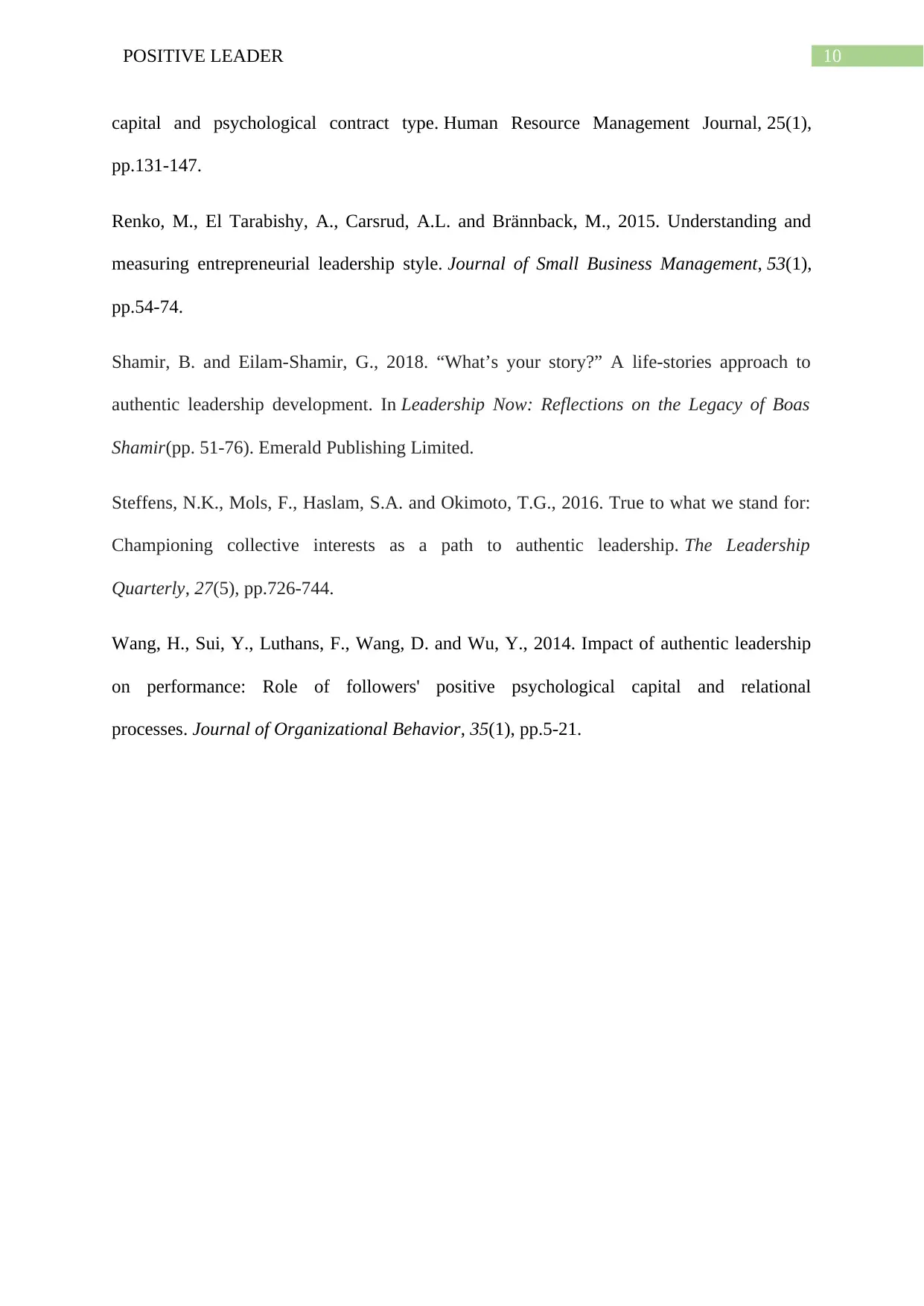
10POSITIVE LEADER
capital and psychological contract type. Human Resource Management Journal, 25(1),
pp.131-147.
Renko, M., El Tarabishy, A., Carsrud, A.L. and Brännback, M., 2015. Understanding and
measuring entrepreneurial leadership style. Journal of Small Business Management, 53(1),
pp.54-74.
Shamir, B. and Eilam-Shamir, G., 2018. “What’s your story?” A life-stories approach to
authentic leadership development. In Leadership Now: Reflections on the Legacy of Boas
Shamir(pp. 51-76). Emerald Publishing Limited.
Steffens, N.K., Mols, F., Haslam, S.A. and Okimoto, T.G., 2016. True to what we stand for:
Championing collective interests as a path to authentic leadership. The Leadership
Quarterly, 27(5), pp.726-744.
Wang, H., Sui, Y., Luthans, F., Wang, D. and Wu, Y., 2014. Impact of authentic leadership
on performance: Role of followers' positive psychological capital and relational
processes. Journal of Organizational Behavior, 35(1), pp.5-21.
capital and psychological contract type. Human Resource Management Journal, 25(1),
pp.131-147.
Renko, M., El Tarabishy, A., Carsrud, A.L. and Brännback, M., 2015. Understanding and
measuring entrepreneurial leadership style. Journal of Small Business Management, 53(1),
pp.54-74.
Shamir, B. and Eilam-Shamir, G., 2018. “What’s your story?” A life-stories approach to
authentic leadership development. In Leadership Now: Reflections on the Legacy of Boas
Shamir(pp. 51-76). Emerald Publishing Limited.
Steffens, N.K., Mols, F., Haslam, S.A. and Okimoto, T.G., 2016. True to what we stand for:
Championing collective interests as a path to authentic leadership. The Leadership
Quarterly, 27(5), pp.726-744.
Wang, H., Sui, Y., Luthans, F., Wang, D. and Wu, Y., 2014. Impact of authentic leadership
on performance: Role of followers' positive psychological capital and relational
processes. Journal of Organizational Behavior, 35(1), pp.5-21.
1 out of 11
Related Documents
Your All-in-One AI-Powered Toolkit for Academic Success.
+13062052269
info@desklib.com
Available 24*7 on WhatsApp / Email
![[object Object]](/_next/static/media/star-bottom.7253800d.svg)
Unlock your academic potential
Copyright © 2020–2026 A2Z Services. All Rights Reserved. Developed and managed by ZUCOL.




